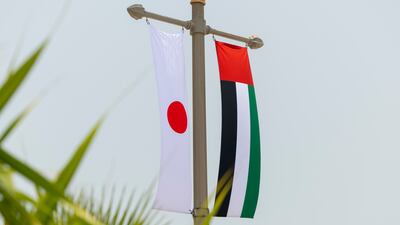Although they can sometimes look it, official presidential and prime ministerial visits are never really breezy affairs. They are usually preceded by a flurry of correspondence, pre-negotiations, negotiations and choreography by the visiting and host countries’ diplomatic corps. The visit itself often draws attention not just locally but from around the world, every tea leaf carefully studied by journalists, analysts, businesspeople, and foreign diplomats. Everyone wants to know, when it’s wheels-up and the ink is dry, what deals were signed, what they’re worth and what they mean.
Just one of these visits would be a big enough deal on its own. This week, the UAE hosted three, by the leaders of India, Japan and Turkey in that order. Indian Prime Minister Narendra Modi’s visit on Saturday was short but sweet; he spent just a day in Abu Dhabi, but used the time to oversee the signing of agreements to ease UAE-India cross-border transactions. The arrangement, which will make it easier for such transactions to happen in local currencies, will be a boon not only to the business community – the UAE has become a favourite investment destination for Indian capital – but also for those sending remittances. UAE-to-India remittance flows are the second largest in the world, after payments from the US to Mexico.
On Monday, Japanese Prime Minister Fumio Kishida touched down in the UAE as part of a tour of Gulf capitals. In Abu Dhabi, he witnessed the signing of 23 agreements and memorandums of understanding, which covered a range of fields critical to the economic futures of both countries: areas like AI, space, transportation, and the circular economy. Mr Kishida and President Sheikh Mohamed also discussed the interests of the UAE and Japan, both currently members of the UN Security Council, in supporting peace, stability, co-operation and dialogue.
Like Mr Kishida, Turkish President Recep Tayyip Erdogan visited the UAE in the context of a larger Gulf tour, in which he has discussed defence and investment deals with Ankara’s regional allies. The goal, Mr Erdogan said in advance of the trip, was “to increase all kinds of relations” between Turkey and the Gulf.
It is easy to see why. As this week’s round of visits shows, Asia’s economy is in the ascendancy, and the UAE and its Gulf neighbours are at the heart of the continent’s prosperity engine. According to the International Monetary Fund, Asia is expected to drive most of the world’s economic growth this year. China and India together will contribute about half of the world’s growth, and the Middle East is expected to contribute 7.8 per cent, which is more than Europe. Asia’s developing economies are expected to be the GCC’s largest trading partner in five years’ time, according to London-based think tank Asia House.
The growing connectivity between the Gulf and the rest of Asia – which extends from economic links to increasing security co-operation – is symptomatic of a broader phenomenon that has been taking shape for years: the centre of gravity in the global economy is shifting eastwards. For those preparing to ride the wave of the so-called “Asian century”, it will come as little surprise that the Gulf is a hub of action.


